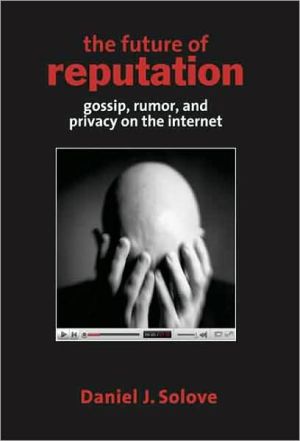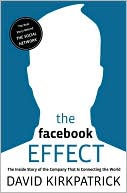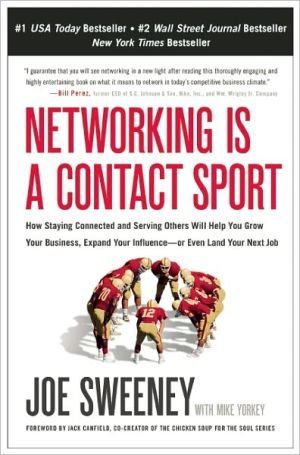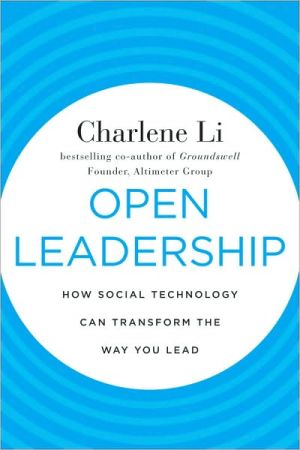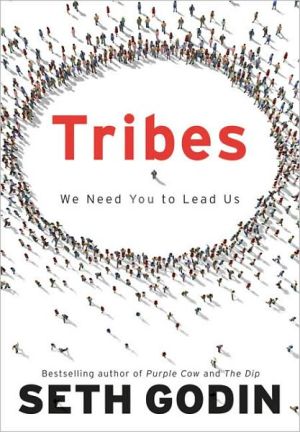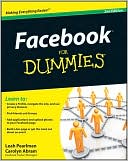The Future of Reputation: Gossip, Rumor, and Privacy on the Internet
Teeming with chatrooms, online discussion groups, and blogs, the Internet offers previously unimagined opportunities for personal expression and communication. But there’s a dark side to the story. A trail of information fragments about us is forever preserved on the Internet, instantly available in a Google search. A permanent chronicle of our private lives—often of dubious reliability and sometimes totally false—will follow us wherever we go, accessible to friends, strangers, dates,...
Search in google:
Teeming with chatrooms, online discussion groups, and blogs, the Internet offers previously unimagined opportunities for personal expression and communication. But there’s a dark side to the story. A trail of information fragments about us is forever preserved on the Internet, instantly available in a Google search. A permanent chronicle of our private lives—often of dubious reliability and sometimes totally false—will follow us wherever we go, accessible to friends, strangers, dates, employers, neighbors, relatives, and anyone else who cares to look. This engrossing book, brimming with amazing examples of gossip, slander, and rumor on the Internet, explores the profound implications of the online collision between free speech and privacy. Daniel Solove, an authority on information privacy law, offers a fascinating account of how the Internet is transforming gossip, the way we shame others, and our ability to protect our own reputations. Focusing on blogs, Internet communities, cybermobs, and other current trends, he shows that, ironically, the unconstrained flow of information on the Internet may impede opportunities for self-development and freedom. Long-standing notions of privacy need review, the author contends: unless we establish a balance between privacy and free speech, we may discover that the freedom of the Internet makes us less free. The Barnes & Noble Review Have you Googled yourself lately? Has your employer? Your date? Your mother? How concerned should you be about what they might find? According to legal scholar and blogger Daniel Solove, author of The Future of Reputation, you might want to be a bit more concerned than you probably are. Here's why: Somebody you've never met can snap your photo and post it on the Internet. Or somebody that you know very well can share your cherished secrets with the entire planet. Your friends or coworkers might be posting rumors about you on their blogs. The personal email you send to others can readily be forwarded along throughout cyberspace, to be mocked and laughed at far and wide. And your children might be posting intimate information about themselves on the Web -- or their friends or enemies might be revealing your family secrets.
The Future of Reputation\ Gossip, Rumor, and Privacy on the Internet \ \ By Daniel J. Solove \ Yale University Press\ Copyright © 2007 Daniel J. Solove\ All right reserved.\ ISBN: 978-0-300-12498-9 \ \ \ Chapter One\ Introduction: When Poop Goes Primetime \ It all began in realspace, on a subway train in South Korea. A young woman's small dog pooped in the train. Other passengers asked her to clean it up, but she told them to mind their own business. That's when it moved over to cyberspace and became even uglier.\ Someone took photos of her and posted them on a popular Korean blog. A blog, short for "Web log," is a running online commentary about one's life or about the issues of the day. Another blogger, Don Park, explains what happened next:\ Within hours, she was labeled gae-ttong-nyue (dog shit girl) and her pictures and parodies were everywhere. Within days, her identity and her past were revealed. Requests for information about her parents and relatives started popping up and people started to recognize her by the dog and the bag she was carrying as well as her watch, clearly visible in the original picture. All mentions of privacy invasion were shouted down.... The common excuse for their behavior was that the girl doesn't deserve privacy.\ Across the Internet, people made posters with the girl's photograph, fusingher picture with a variety of other images. The dog poop girl story quickly migrated to the mainstream media, becoming national news in South Korea. As a result of her public shaming and embarrassment, the dog poop girl dropped out of her university.\ The story of the dog poop girl wasn't known in the United States until Don Park wrote about it in his blog, Don Park's Daily Habit. It became even more popular when the blog BoingBoing discussed the story. BoingBoing receives nearly ten million visits per month-more than the circulations of many newspapers and magazines. In no time, newspapers and websites around the world were discussing the story.\ The story of the dog poop girl raises a number of intriguing issues about the Internet, privacy, norms, and life in the Information Age. Not picking up your dog's poop is bad behavior in most people's books, but was the reaction to her transgression appropriate? We all have probably engaged in rude behavior or minor wrongdoing. But is it going too far to transform the dog poop girl into a villain notorious across the globe?\ The dog poop girl is just one example of a much larger phenomenon taking place across the Internet. Increasingly, people are exposing personal information about themselves and others online. We can now readily capture information and images wherever we go, and we can then share them with the world at the click of a mouse. Somebody you've never met can snap your photo and post it on the Internet. Or somebody that you know very well can share your cherished secrets with the entire planet. Your friends or coworkers might be posting rumors about you on their blogs. The personal email you send to others can readily be forwarded along throughout cyberspace, to be mocked and laughed at far and wide. And your children might be posting intimate information about themselves on the Web-or their friends or enemies might be revealing your family secrets. These fragments of information won't fade away with time, and they can readily be located by any curious individual. Like the dog poop girl, you could find photos and information about yourself spreading around the Internet like a virus.\ This is a book about how the free flow of information on the Internet can make us less free. We live in an age drenched in data, and the implications are both wonderful and terrifying. The Internet places a seemingly endless library in our homes; it allows us to communicate with others instantly; and it enables us to spread information with an efficiency and power that humankind has never before witnessed. The free flow of information on the Internet provides wondrous new opportunities for people to express themselves and communicate.\ But there's a dark side. As social reputation-shaping practices such as gossip and shaming migrate to the Internet, they are being transformed in significant ways. Information that was once scattered, forgettable, and localized is becoming permanent and searchable. Ironically, the free flow of information threatens to undermine our freedom in the future.\ These transformations pose threats to people's control over their reputations and their ability to be who they want to be. Will we enslave ourselves by making it impossible to escape from the shackles of our past and from the stain of gossip and false rumors? How much information should we know about each other? How do we allow people to control their personal information without curtailing free speech or stifling freedom on the Internet?\ This book will take a journey through the ways in which private lives are being exposed online, and it will examine the implications. People have profound new ways to communicate, yet the gossip, shaming, and rumors that are being spread online are sometimes having devastating effects on people's lives. Should we do something to stop the exposure of private secrets on the Internet? Can we do anything? In this book I will propose a framework for how we can address these problems-by recognizing a new and broader notion of privacy and by reaching a better balance between privacy and free speech.\ THE INTERNET AS A TEENAGER\ About a decade ago, the Internet in its early days was greeted with a kind of euphoria. Its potential seemed to be boundless, and people viewed it as a wondrous zone of freedom. A few years later, the giddiness dimmed with foreboding. Commentators began to point out that the Internet wasn't inherently free-it could be transformed into a radically controlled and restricted world. In 1999 the Internet law expert Lawrence Lessig declared in his famous book, Code: "We will see that cyberspace does not guarantee its own freedom but instead carries an extraordinary potential for control."\ Today, the Internet is no longer in its infancy. Although developed long ago by researchers, the Internet entered into popular usage in the mid-1990s. It is now maturing into its second decade in mainstream culture-its teenage years. The Internet indeed has proven to be a place of both rigid control and unbounded freedom.\ This book focuses on the free dimensions of the Internet. The future of the Internet involves not only the clash between freedom and control but also a struggle within the heart of freedom itself. The more freedom people have to spread information online, the more likely that people's private secrets will be revealed in ways that can hinder their opportunities in the future. In many respects, the teenage Internet is taking on all the qualities of an adolescent-brash, uninhibited, unruly, fearless, experimental, and often not mindful of the consequences of its behavior. And as with a teenager, the Net's greater freedom can be both a blessing and a curse.\ In the offline world, the dog poop girl would have been quickly forgotten. The incident would have ended when she left the subway train. But the Internet enabled the few witnesses of her transgression to express their outrage to millions. Indeed, the Internet affords people unprecedented new ways to communicate with others. It has blossomed into a fantastic world of free expression, teeming with chatrooms, online discussion groups, and blogs, which are proliferating at a breathtaking rate. Everyday people express themselves to a worldwide audience, something never before possible in the history of humankind.\ In May 2005 I became a blogger. Within an instant, I could publish virtual op-eds to the entire world. Billions of people potentially could access my thoughts. The blog I posted on was visited thousands of times a day. A lot of people were reading. What made this so exciting was that I'd never had any success getting an op-ed published. I had tried many a time, but the editors just wouldn't give me a plot of valuable space on their pages. Suddenly I no longer need them. I can get my thoughts out far and wide without their help.\ Blogging brings instant gratification. I can quickly work up my thoughts into a post and publish them to the website for the world to read. People then post comments, and I can have a discussion with them. Blogging has allowed me to explore many an idea that might have languished in a forgotten corner of my mind. In fact, this book was inspired by my blog post about the dog poop girl case.\ Blogs are everywhere these days. There are blogs about virtually any topic under the sun. Dogs and poop are both popular topics for blogs. A blog called Doggie News gleefully reported the dog poop girl story. There's a blog purportedly written by dogs called Blogdogs. There's even a blog about poop called Poop Report. Needless to say, the dog poop girl story was a big scoop for Poop Report. It is hard not to get excited about these developments, to see the great freedom and power that the Internet can provide to everyday people. But while many bloggers talk about politics, books, music, dogs, or other topics, a large number of bloggers enjoy speaking about their personal lives, their sexual experiences, the people they know, and even the girl on the train who wouldn't clean up after her dog. Details about many people's private lives are finding their way onto the Internet, often without the subjects' knowledge and consent. And in a number of cases, the consequences for these people are severe. As people use the freedom-enhancing dimensions of the Internet, as they express themselves and engage in self-development, they may be constraining the freedom and self-development of others-and even of themselves.\ THE NORM POLICE\ In the dog poop girl case, people harnessed the power of the Internet to enforce a norm-the obligation to clean up after one's dog. Norms are "social attitudes of approval and disapproval," the law professor Cass Sunstein writes. Norms specify "what ought to be done and what ought not to be done." Norms bind societies together; they regulate everyday conduct; they foster civility. They are the oil that reduces the friction of human interaction. We need to maintain norms of courtesy so that we can all get along nicely. Imagine if we didn't have norms like first-come, first-served. Fisticuffs would quickly follow. In short, norms are a central mechanism through which a society exercises social control.\ To be effective, norms must be regularly followed. If people flout norms and get away with it too often, norms can weaken and lose their influence over behavior. When somebody butts in line, many people usually just grumble under their teeth, but there are a few folks who confront that norm violator. These "norm police" help enforce norms, and they are essential to ensuring that norms remain strong.\ The dog poop girl violated a norm that most people would agree with, but were the norm police too harsh in punishing her? Most norm enforcement involves angry scowls or just telling a person off. The blogosphere can be a much more powerful norm-enforcing tool, allowing bloggers to act as a cyberposse, tracking down norm violators and branding them with digital marks of shame. Having a permanent record of norm violations is upping the sanction to a whole new level.\ Don Park's blog contains some interesting comments by his readers about the dog poop girl. Some commentators were sympathetic to her plight, likening the attacks on her to a "witch hunt." But others celebrated her shaming. One theme is responsibility. In the words of one commentator:\ Every once in a while, it's good for someone who is an ass to be shown as an ass. Whether to a small group or large crowd. She needs to learn to be accountable, whether in front of 5 people or 5,000,000 people. It's really all the same. Manners are manners.\ Another commentator opined:\ In the old days, people conformed to societal expectations and norms based on the feedback they got from those around them. These days, especially in large urban areas where anonymity prevails, most people seem to be afraid to criticize anyone for anything. Maybe now technology will provide a way to reinstate that societal feedback. I doubt this episode would have occurred in a small town where everyone knows everyone and such actions would have resulted in immediate consequences.\ Yet another remarked:\ Lack of personal responsibility is the problem here. And it's really prevalent these days.\ It is certainly true that the Internet better enabled people to hold the dog poop girl responsible for her behavior. People who act inappropriately might not be able to escape into obscurity anymore; instead, they may be captured in pixels and plastered across the Internet. They'll be held responsible for their actions. But perhaps responsibility cuts both ways. Shouldn't the cyberspace norm police also have responsibilities? What if they get out of hand? What if they wrongly accuse somebody? What if their shaming punishes a minor transgression too much?\ PRIVACY\ A common thread running through the comments about the dog poop girl is that she should expect no privacy because she was in public. One commentator wrote:\ The initial blogger. Do I think he had every right to post her? Yep. She was in public, and it really doesn't matter if she was in front of 100 or 1,000,000 people, she was willing to act that way in the public sphere.\ Under existing notions, privacy is often thought of in a binary way-something is either private or public. According to the general rule, if something occurs in a public place, it is not private. But a more nuanced view of privacy suggests that this case involved taking an event that occurred in one context and significantly altering its nature-by making it permanent and widespread.\ The dog poop girl would have been just a vague image in a few people's memories if it hadn't been for the photo entering cyberspace and spreading around faster than an epidemic. Despite the fact that the event occurred in public, was there a need for her image and identity to be spread across the Internet?\ Yet another commentator stated:\ I really don't think it matters that it came out on the internet. It happened in a public place so it is excusable to discuss it in a public forum. This isn't going to ruin her life, it might make her clean up her dog's mess for a month though while the story goes around. We are a fickle bunch and she will be forgotten before the end of the season.\ But this comment is inaccurate. She will not be forgotten. That's what the Internet changes. Whereas before the girl would have been remembered merely by a few as just some woman who wouldn't clean up dog poop, now her image and identity are eternally preserved in electrons. Forever, she will be the "dog poop girl"; forever, she will be captured in Google's unforgiving memory; and forever, she will be in the digital doghouse for being rude and inconsiderate. The dog poop girl's behavior was certainly wrong, but we might not know the whole story behind the incident to judge her appropriately. And should people's social transgressions follow them on a digital rap sheet that can never be expunged?\ The easy reaction is to steel ourselves and chalk it up to life in the digital age. But the stakes are too high for that. We perform an enormous range of activities in public. Do we want to live with the risk that people can snap our picture wherever we are and put it up on the Internet? We expose a litany of personal information as we go about our daily lives. Do we want it to be permanently posted online for the world to see? Consider the thoughts of another commentator to Don Park's blog:\ It reminds me of the struggles that editors face when deciding about what pictures to run in the newspaper. Those editors need to make a judgement call based on the value of the picture and its relevance to the story. But here, the person was outraged and ran the picture of the girl. That's totally different. It shows the dangerous flip side of citizen media. Moral outrage is easy to flame. But the consequences can be mortal. Will the ease in inciting moral outrage create a mob driven police state? It may be when the powerful realize how they can use citizen "reporters," to influence mobs. That seems to be one of the real dangers of citizen journalism.\ (Continues...)\ \ \ \ \ Excerpted from The Future of Reputation by Daniel J. Solove Copyright © 2007 by Daniel J. Solove. Excerpted by permission.\ All rights reserved. No part of this excerpt may be reproduced or reprinted without permission in writing from the publisher.\ Excerpts are provided by Dial-A-Book Inc. solely for the personal use of visitors to this web site. \ \
Preface viiIntroduction: When Poop Goes Primetime 1Rumor and Reputation in a Digital WorldHow the Free Flow of Information Liberates and Constrains Us 17Gossip and the Virtues of Knowing Less 50Shaming and the Digital Scarlet Letter 76Privacy, Free Speech, and the LawThe Role of Law 105Free Speech, Anonymity, and Accountability 125Privacy in an Overexposed World 161Conclusion: The Future of Reputation 189Notes 207Index 237
\ Harvard Law ReviewTimely and provocative, The Future of Reputation explores a principal dilemma of our age and provides a workable solution that may appeal to readers on both sides of the debate.—Harvard Law Review\ \ \ \ \ The Chronicle of Higher Education[A] brilliant recent book. . . . An honest and troubling account of the ways that we have become our own enemies.—Siva Vaidyanathan, The Chronicle of Higher Education\ — Siva Vaidyanathan\ \ \ \ Utne ReaderSolove offers practical advice on how societal norms and laws can catch up with technology's relentless progress. . . . [A] funny and readable call for netizens and legal scholars to accept a more nuanced understanding of privacy.—Bennett Gordon, Utne Reader\ — Bennett Gordon\ \ \ \ \ \ Wilson QuarterlyMuch of The Future of Reputation catalogs the ways in which privacy has diminished in an age in which technology allows for the diffusion of information and in which punishments for this diffusion are weak or sometimes simply impratical.—Gary Alan Fine, Wilson Quarterly\ — Gary Alan Fine\ \ \ \ \ \ The Barnes & Noble ReviewHave you Googled yourself lately? Has your employer? Your date? Your mother? How concerned should you be about what they might find? According to legal scholar and blogger Daniel Solove, author of The Future of Reputation, you might want to be a bit more concerned than you probably are. Here's why: \ Somebody you've never met can snap your photo and post it on the Internet. Or somebody that you know very well can share your cherished secrets with the entire planet. Your friends or coworkers might be posting rumors about you on their blogs. The personal email you send to others can readily be forwarded along throughout cyberspace, to be mocked and laughed at far and wide. And your children might be posting intimate information about themselves on the Web -- or their friends or enemies might be revealing your family secrets.\ It's hard not to note the paranoia of this vision, which resembles the "MySpace: Threat or Menace?" stories lately clogging the media. But Solove has a point: there is a potential "dark side" to our new abilities to publish on the Internet via blogs, photo-sharing services, and video sites, found in the threat that such technologies could pose to our privacy. In an era in which anyone can easily publish anything about anyone else, individual control over one's reputation could become difficult. In fact, such freewheeling ability to say anything, often with the protection of a pseudonym, can result in viral forms of public shaming and the spread of vicious gossip. It might not have happened to us, but it's happened to people like us, who were mostly minding their business until the blogosphere seized upon some embarrassing detail from their private lives, publishing it for all to see -- and ridicule.\ Perhaps, Solove acknowledges, our concerns about privacy might diminish as we move into an age in which sharing the intimate details of our lives online becomes the norm. But it's also possible that public exchange of the kind of information that we have previously kept within much closer social circles will result in a society that is both "oppressive and uncontrollable, where people are vulnerable to having their reputations destroyed in an instant, where mistakes in one's past can forever thwart opportunities in one's future." Recent concerns about privacy violations -- such as the wiretapping of private citizens by the government and other intrusive forms of surveillance -- have often been met with an insistence that if one doesn't have anything to hide, one has nothing to fear. Solove disagrees; even when we aren't up to something that we don't want the public to see, we still require privacy in order to think and act freely, without a constant sense of self-censorship.\ Solove's primary concern, to use a term popularized by the French theorist Michel Foucault, is a new kind of digital panopticon, a system within which we no longer require a "Big Brother" looking over our shoulders, because we are all constantly monitoring one another -- and as a result, monitoring ourselves. "Should people's social transgressions follow them on a digital rap sheet that can never be expunged?" Solove asks in his introduction. A worthy question; the Internet creates an environment in which a person can become famous overnight, but more often than not that fame is based on something that the person would just as soon forget, preferring that it be allowed to pass into obscurity. Bizarrely, the threat that we faced in childhood, that some stupid thing we'd done in third grade would be placed on our "permanent record," suddenly has the potential to be real -- and available to anyone with a few minutes, a web browser, and access to Google.\ In the first half of the book, Solove focuses on the Internet's transformation of gossip and shaming rituals, creating a potential crisis for many in controlling their reputations; in the second half, he explores the possible legal remedies for those whose privacy is violated, and the concerns about free speech that such legal remedies raise. The Future of Reputation seeks a balance, arguing that "we must protect privacy to ensure that the freedom of the Internet doesn't make us less free," but also that we must "balance the protection of privacy against freedom of speech."\ With such sharp focus on the spread of personal information through online gossip Solove tends to overlook another potential threat to our privacy -- the corporate ownership of much of the information that we publish on the Internet. Even scholars such as danah boyd, one of the most enthusiastic defenders of social networking systems, are concerned about the privacy implications of, for instance, Facebook's opening of its records to Google searches. The problem that such scholars have pointed to, however, is not the mere presence of the data online, but the corporate control of access to it, and the commercial or governmental purposes to which it might be put. For instance, Facebook's terms of service include the following:\ All content on the Site and available through the Service, including but not limited to designs, text, graphics, pictures, video, information, applications, software, music, sound and other files, and their selection and arrangement (the "Site Content"), are the proprietary property of the Company, its users or its licensors with all rights reserved.\ Much of that "site content" is uploaded by users, who may or may not recognize the rights they're handing over to the company. Perhaps Facebook will never do anything with the pictures I uploaded from last night's party -- but if they do, will I have any ability to stop them? \ It's thus a bit jarring when, late in the book, Solove points to current copyright law as a model for how private information might be controlled. He acknowledges that the "balance of freedom and control" in copyright law "has been the subject of considerable debate and controversy," but he doesn't consider the difference between the control of information for profit-making purposes and for purposes of maintaining personal privacy. Copyright law and privacy issues make odd bedfellows; is the suggestion that we "own" the details of our private lives?\ Moreover, blurring the relationship between privacy and intellectual property could have quite chilling effects on personal creativity and expression. Solove acknowledges that forum hosts faced with legal action for privacy violations might become nervous and remove information too quickly, but he doesn't follow through with this note as far as one might like. For instance, he might have explored the ways that hair-trigger responses to DMCA takedown notices have at moments not served the protection of intellectual property but instead assisted in the corporate infringement on the rights to free speech. While takedown requests from individuals who feel themselves defamed or feel their privacy rights violated by speech about them on the Internet are unlikely to produce the same kinds of knee-jerk responses, largely because individuals and their lawyers present a far smaller threat than do major corporations, the possibility of such infringements on the freedom of expression remain.\ In the end, The Future of Reputation argues that we need to develop commonly held cultural norms for the treatment of private information in the blogosphere. And there should be legal remedies for those whose rights have been violated and whose informal attempts to seek resolution have failed. "The law," he argues, "is a puny instrument compared with norms." It's also a blunt instrument, one that can create greater problems than those it tries to solve. Solove's attempt to find a solution in a "middle path" between information libertarianism and authoritarian control is compelling, but perhaps most useful is his highlighting of the problem in the first place. In the future, we may all be famous for fifteen minutes, but the Internet can preserve that fame -- or infamy -- forever. We might do well to consider, with Solove, what we lose when we give up our privacy, and what aspects of freedom to communicate are worth preserving. --Kathleen Fitzpatrick\ Kathleen Fitzpatrick is Associate Professor of English and Media Studies at Pomona College and author of The Anxiety of Obsolescence: The American Novel in the Age of Television, published in 2006 by Vanderbilt University Press. She is coordinating editor of MediaCommons and has blogged at plannedobsolescence.net since 2002.\ \ \
